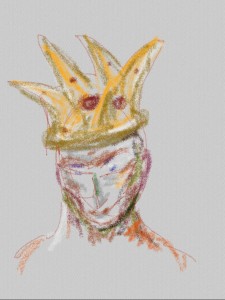Will you find me, will I find you, will you know me? Questions to perplex the weary and destitute. To language or not to language, that is more likely to be the question. Hamlet, Hamlet let’s sit down and talk about this. Look, I agree this is horrible and neither of us has any idea how to put this into words, into language, into this representational system of grunts and groans rendered into mysterious black marks on a white ground. Don’t go down that particular road Hamlet, it will only lead to despair and the mocking figure of suicide will beckon most attractively.
Paul Klee begins his Creative Confession, 1920: ‘Art does not reproduce the visible, it makes visible. A tendency towards the abstract is inherent in linear expression: graphic imagery being confined to outlines has a fairytale quality and at the same time can achieve great precision. The purer the graphic work – that is, the more the formal elements underlying linear expression are emphasised – the less adequate it is for the realistic representation of visible things.’
How to start things off? There’s nothing like a cataclysmic event to announce the new, but do we or can we accept the inevitable trauma of such an event or are we merely impotently helpless in the grip of its power and excitement?
How can Hamlet settle his mind to doing a fair day’s work for a fair day’s pay after the trauma that has fragmented, blown apart his mind? At least he has Shakespeare to do his thinking for him, to carve the linear expression of his descent. How do we express what we cannot think in words or describe with other sorts of marks on paper. There is something so final about not being able to shape certain unformed thoughts into words or some other expressive art – painting or music, for example. How do we ever learn what the unformed potential of a person might have become after they have gone down the route of suicide?
By chance, a friend, an artist, pointed me in the direction of the work of Charlotte Salomon. A chunk of whose work is contained in a huge tome based on and focussed around her large scale work, Life? Or Theatre? A life story told in pictures and words. Charlotte was born into a wealthy, assimilated Jewish family in Berlin, 1917. Her mother committed suicide in 1926. Of course before that the European nations had savaged each other in an orgy of bloodshed. There are screams that emerge from the need to find a narrative that makes sense. The Russian Revolution offers a narrative of sorts and one that is fought for in Germany after the cessation of formal war in 1918, but this ends in failure and after the US/European financial disaster at the end of the twenties, Germany tries its infamous Nazi experiment that includes the demonising if the Jews. Charlotte’s life ended in 1943, murdered in Auschwitz.

